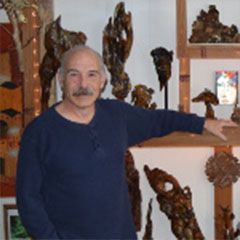Howard Vinick

Howard Vinick was born and raised in Schenectady County, spending his childhood years in Niskayuna. From the time he was young, Howard has been fascinated with art. He describes being, “An artist for his whole life,” always embracing opportunities to use his creativity to make beautiful artwork. His passion for art ultimately inspired him to pursue a degree in graphic arts and psychology at Alfred University. While the experiences of his early years paint the portrait of a relatively normal life, lurking beneath the surface were some unfortunate and deep-seated problems: he struggled with addiction and mental health issues.
Howard’s dependency on alcohol can be traced back to when he was a very young child in the care of a family nanny who used, “an old-fashioned remedy of vodka, tea and lemon,” to soothe and pacify the children in her care. He attributes this early exposure to alcohol as the reason he continued to drink throughout much of his childhood.
Howard lived as a highfunctioning alcoholic for most of his life, meaning that he was able to maintain jobs and relationships while exhibiting alcoholism. In addition to struggling with alcohol he also began using cocaine and heroin while in college. A typical day in his life back then was consumed with alcohol and drugs. “I would start the day with a liter of vodka, use heroin and cocaine throughout the day, and drink Jack Daniel’s to fall asleep at night,” he said. While treatment helped him permanently overcome his drug addiction, unfortunately his alcoholism returned.
It wasn’t until 2006 that Howard was officially diagnosed as suffering from mental illness, specifically manic depression, bi-polar disorder and PTSD. After receiving counseling and the proper medication, his condition improved. However, things became especially difficult in 2011 when he was laid off from his job. “I floundered for a long time... and continued to drink until the money was all gone”, he said. Moreover, his inability to continue meeting with his counselor to get his medication caused the symptoms of his mental illness to return. Unemployed for an extended period of time and having no resources, Howard was unable to keep the family house and it was lost to foreclosure. In April 2015, he became homeless and began living out of his car, selling possessions to be able to buy food and support his alcohol addiction. By December 2015, he had lost use of the car and was out in the cold, living in a shabby tent in downtown Schenectady near the railroad tracks. It was at this point that an employee of Rehabilitation Support Services discovered his situation and referred him to SCAP.
“I had nothing... I was hopeless and helpless and I needed to find normalcy in my life again,” he said. Once working with case managers from SCAP, it was determined that Howard was eligible for the Supportive Housing Solutions program, which provides intensive case management and benefits assistance. He was also enrolled in Shelter Plus Care, a housing program for people with a history of homelessness, substance abuse, and/or mental health issues.
SCAP helped Howard in many ways including, applying for Food Stamps, getting decent clothing, finding affordable housing, buying household furnishings, helping with utility bills, and getting a new copy of his social security card. “SCAP is the best to deal with because they bend over backwards to help,” he said. “Regardless of what services you need, they help provide it. They are always compassionate, understanding and knowledgeable…it was an amazing experience.”
With help from SCAP, Howard found a suitable place to live and was stably housed in an apartment in April 2016. Living there for over a year now, the space is filled with many of his latest art pieces, making it feel like home. And most importantly, after struggling with alcoholism for his entire life, Howard is celebrating one year of sobriety this June. Now with a greater measure of stability in his life, Howard continues to thrive and is on the path toward his goal of self-sufficiency.
Today, Howard is a member of SCAP’s steering committee on Supportive Housing Solutions, allowing him to share his unique perspective and experiences to help improve the program for others. He spends much of his time working on art projects and recently began experimenting with reclaimed wood and tree bark, using the materials and his creativity to make different kinds of sculptures. In the future he hopes to open his own art studio and develop a market to sell his artwork.
